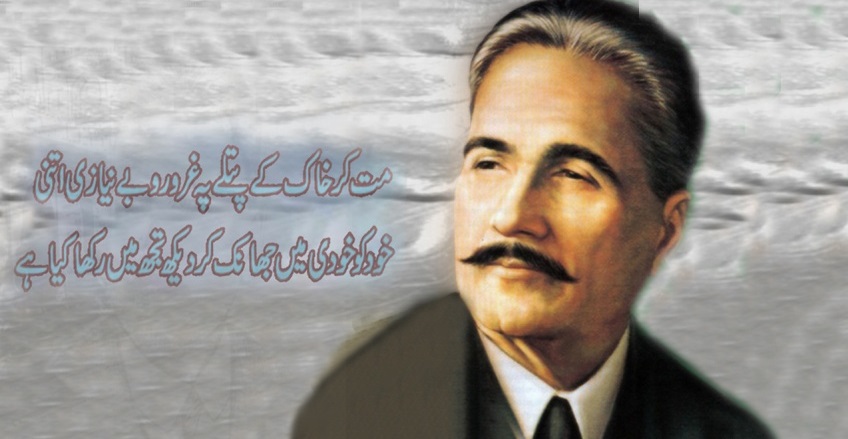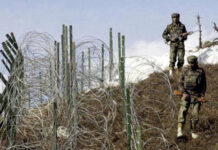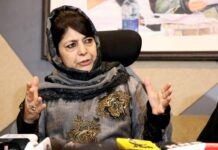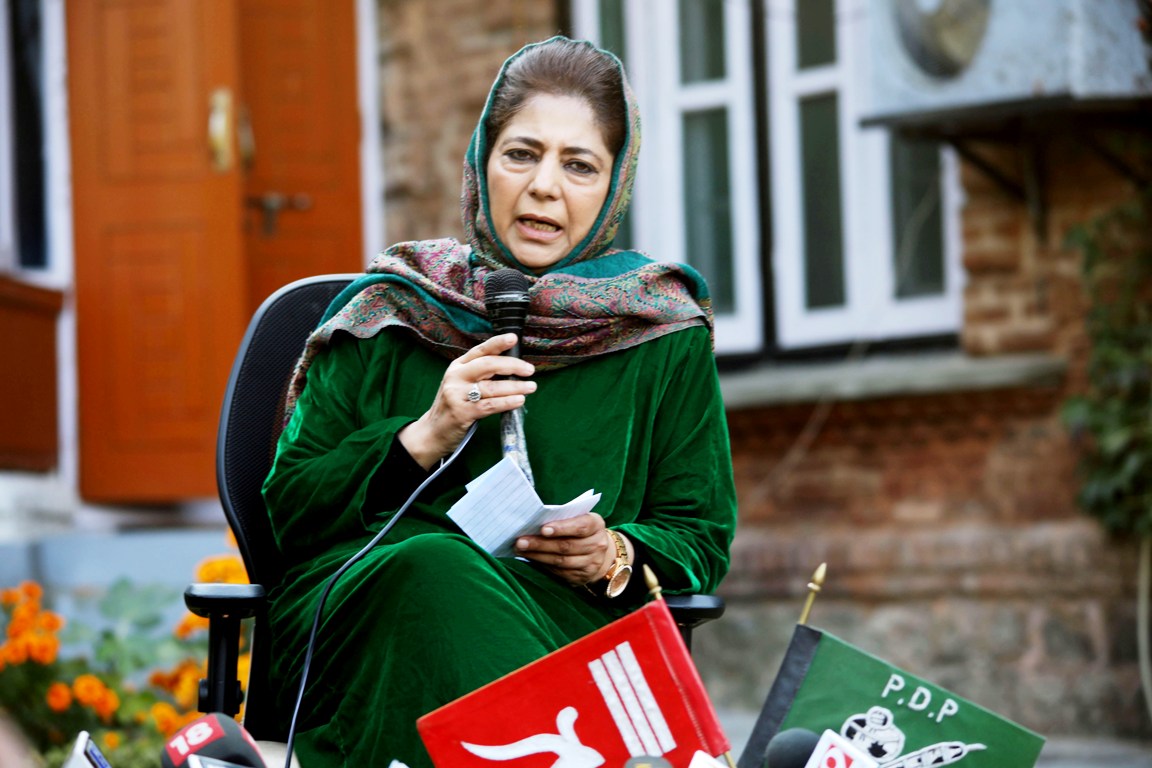By: Ajaz Lone
The contemporary society in which we are living is in a rigorous condition. There is a chaos and confusion, distress and misery everywhere. Every primary institution of our society is in crises. Be it family, marriage, kinship, religion, education, economy or a social system as a whole, everything need an immediate resurgence.
Also Read: The Poetic Quadrate
Iqbal touched all these institutions in his revolutionary thought and poetry. He really was multi-dimensional personality. He was a great sociologist, educationalist, political scientist, economist and what not.
Nature gives birth to great philosophers and poets when the need arises. Natural calamities, wars, epidemics, storms and earthquakes etc, causing human sufferings have always given birth to creative minds.
Iqbal was born in 1877 AD when the inhabitants of India were suffering from miseries and deaths while struggling for the independence of their country from British rule. The people of Muslim community of India were the worst hit. They were being crushed ruthlessly.
At that time, Iqbal’s poetry played miraculous role. It awakened the people from slumbering hopelessness, made them stand on their own feet. They were united and then fought courageously for independence with the result that they achieved a free homeland for them within a few years time.
 In the contemporary world, when there is a general propensity for scientific reasoning and standards of life, with an increasing tendency towards materialism and individualism, the eruption of various social problems is quite obvious, and to eradicate to the these social problems the need of social reformers is inevitable in every society.
In the contemporary world, when there is a general propensity for scientific reasoning and standards of life, with an increasing tendency towards materialism and individualism, the eruption of various social problems is quite obvious, and to eradicate to the these social problems the need of social reformers is inevitable in every society.
Among the contemporary sociologists of the world, Iqbal occupies an important position as a social reformer. The basic aim of the sociologist is to maintain the social order of the society. In modern society the importance of the sociologists becomes immense.
Iqbal was among those few social reformers who championed the cause of freedom, social justice, world peace, unity of mankind and human brotherhood with great vigour and eloquence. Through his writings and speeches, he has out-rightly and categorically challenged the existing socio-political order of his age. He was deeply and intimately concerned with the contemporary social problems. The poet urged and advised his youngsters to launch a crusade against the worn-out social political systems of his own time.
As a keen observer, he closely studied the varied problems that confronted the present society. He was shocked to see the existing perilous conditions of the world full of doubts, fear, hatred, suspicion, and the evils of war. He earnestly tried to make man conscious of the social evils that had crept into the society.
Also Read: Do We Own Iqbal?
Having minutely observed and examined the various socio-political, economic and religious conditions of the world, Iqbal had formed a firm view that the salvation of mankind lay in the synthesis of the eastern culture and the western culture. Iqbal wanted to have a synthesis of reason and faith by wedding intellect to love.
Similarly, Iqbal believed that education is the corner stone of any society. But unfortunately our educational system has taken a great twist from last few decades; it is in the deep slumber. Education which signifies the development of personality is a purposive process; it is a process which is consciously directed towards some end.
KG Saiyadain, remarks that “Education in its full and correct signification must be visualized as the sum total of cultural forces which play on the life of individual. Iqbal’s educational philosophy has great relevance today, though he is not an educationist in the limited sense.
Iqbal lays special emphasis on the cultural factors and the transmission of traditions from one generation to another his philosophy of life is of infinite value for education.
Like other educationists, he stresses the fundamental point that the educator must necessarily inquire into the nature and function of the self in relation to the environment in which it is placed; education is concerned with the problems of individual and society. It is the process of enabling the individual to take his rightful place in the society. It must, therefore, be interested in those studies which concern the individual on the one hand and the society on the other.
According to Iqbal, the highest aim of education is to strengthen the individuality of all persons so that they may develop their potentialities. Naturalists, on the contrary, stress on adjustment to environment as the educational aim. Briefly, education, according to Iqbal, is a means to an end and not an end itself.
The end of education being Islamic Ideology and Culture. It is through education that a culture perpetuates itself. Since every system of education basically consists of social ideals, norms, and values and is based on its specific culture, Iqbal exhorts us not to imitate other nations.
Also Read: Commemorating A Legend: Allama Iqbal
For this tendency of aping, according to him, thus the primary purpose of education should be to imbue the students with their religion and ideology. They should be taught the meaning and purpose of life, man’s position in this world, the doctrine of Tawhid (Unity of God), Risalah (Prophethood), Akhira (Life here-after) and their bearing upon Individual and social life, the Islamic values of morality, the nature and content of Islamic culture, and the obligations and the mission of a Muslims.
Education should produce men with deep-held conviction about Islamic ideals of Individual and collective life.
Iqbal as a political scientist is equally relevant in modern and so called democratic world. In the middle of the 19th century, sub-continent was sunk in the depths of despondency. Defeat, humiliation and despair were writ large on every face. The suffering of Muslims were really tremendous, however, a few Muslim thinkers rose to the occasion and engaged themselves in the task of lifting the Muslim out of their pitiable condition.
They started analysing the causes of the suppression and downfall of Muslims and tried to suggest remedies according to their own heights. Iqbal was one and the most influential among them.
Also read: Shariati on Iqbal
Iqbal preferred a quite life and had no liking for the noisy life of a politician, but as he played the role of a reformer of Muslim society, he could not refrain from taking part in the various movements of his country.
In 1926, the poet was elected member of the Punjab legislative council, and to this was the beginning of his period of active politics. He was born at a time when Islam had fallen a prey to the stormy forces of the world. The Muslim political power was declining and the conflict between the western and eastern civilizations had created unforeseen and serious problems for the Muslim world.
In his youth, Iqbal was inspired by his love for his country and, as such, some of his early poems breathe the national spirit. But after his return from Europe, his political vision was that of a pan-Islamist and his views on Indian politics were largely determined by his anxiety to protect Indian Muslim-their religion, culture and civilization.
Iqbal was not the blind follower of such political thought of the west as was based on desperate nationalism imported as something sacred into many lands of the east. He, however, attached special significance and value to experience and nature. The territorial basis of nationalism as conceived by European thinkers found no favour with Iqbal who, as a philosopher viewed mankind as a single nation.
In his threat to world peace and, therefore, he never sympathized with national movements. The attitude of Indian Muslims towards nationalism and the democracy were largely the result of Iqbal’s optimistic teachings. He laid great emphasis on the development of human society as a functioning whole. Iqbal was not attracted by the outward democratic form of government in Europe.
In his eyes, it was a colossal hoax and it held no prospects of human deliverance.
As a political philosopher, Iqbal was a staunch supporter of internationalism as conceived by Islam. He was not so optimistic about European internationalism which appeared after the Great War, almost under compulsion.
For many years the authority of the west and unfortunately the league had been looked upon as an institution just to feed the vanity of some of the dominating nations of the world. Iqbal was very sympathetic towards the Muslim community of the sub-continent.
That is evident from his presidential address which Iqbal read at the Allahabad session (Dec. 1930) of the All-India Muslim league. It discusses the political problems of Muslims in India and suggests their solution.
Some of the poet’s statements are, in a sense, historic and the address as a whole is remarkable for its pan-Islamic breath. Iqbal was thus inspired by a vision of a world-wide Islamic state of unified Muslim millet, no longer divided by racial or territorial considerations.
He thinks that racial or territorial considerations are the root cause of disruption in humanity, dissensions between nations and nations, and hostilities between one state and another.
Islam, points out Iqbal, finds the foundations of world-unity in the principle of ‘Tawhid’. Islam as a polity is only a practical means of making this principle of a living factor in intellectual and emotional life of mankind.
It demands loyalty to the god not to thrones. And since god is the ultimate spiritual basis of all life, loyalty to god virtually amounts to man’s loyalty to his own ideal nature.
Also read: Iqbal Armaghan-e-Hijaz
Similarly, we quite often ignore Iqbal as the thought provoking and practical economist of modern economic system.
Iqbal’s first book Almul-Iqtisad has a great relevance today, Contemporary world, is in a deep economic crisis. So, the importance of economics cannot be denied. The basis of its importance is not on a common feeling that one’s political and social freedom is of no value without economic freedom and similarly the achievement of solidarity, integrity and contentment is impossible without there being economic justice.
But it is important due to certain questions in the modern human mind regarding poverty, unemployment and indigence causing socio-economic injustice in spite of unlimited wealth and surprising progress in the productive resources of the world.
Why is it that about 60% of the people even today are without food, clothing and shelter? Why are we not having collective welfare?
Iqbal believed that the solution for economic ills of all human communities has been put forward by Islam in the Quran.
The Quran has devised a system comprising the laws of inheritance, Zakat, Haj etc, to keep its power within proper limits.
The crux of whole Iqbalian thought is Islamic teachings. He said that Islam is our guide and a complete code of life for us. It is the source not only of our spiritual and moral values but also of our temporal values and as long as Islam remains the basis of our thought and activities, there is a chance of survival for us.
It is the most comprehensive, dynamic and progressive way of life in the world providing guidance and instructions for every aspect of life.
 Ajaz Lone is the Research Scholar in Iqbal Institute of culture and Philosophy, university of Kashmir.
Ajaz Lone is the Research Scholar in Iqbal Institute of culture and Philosophy, university of Kashmir.















